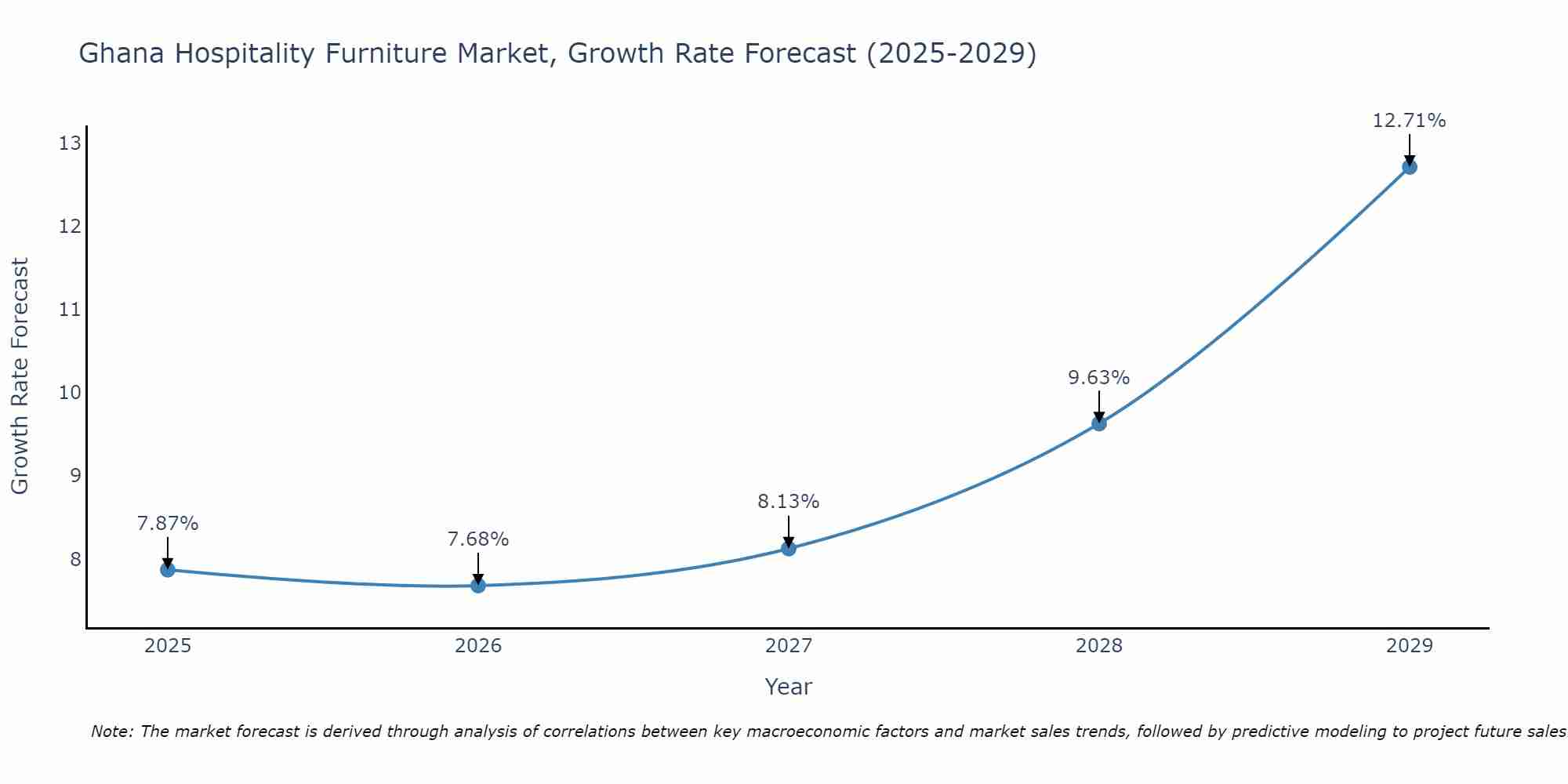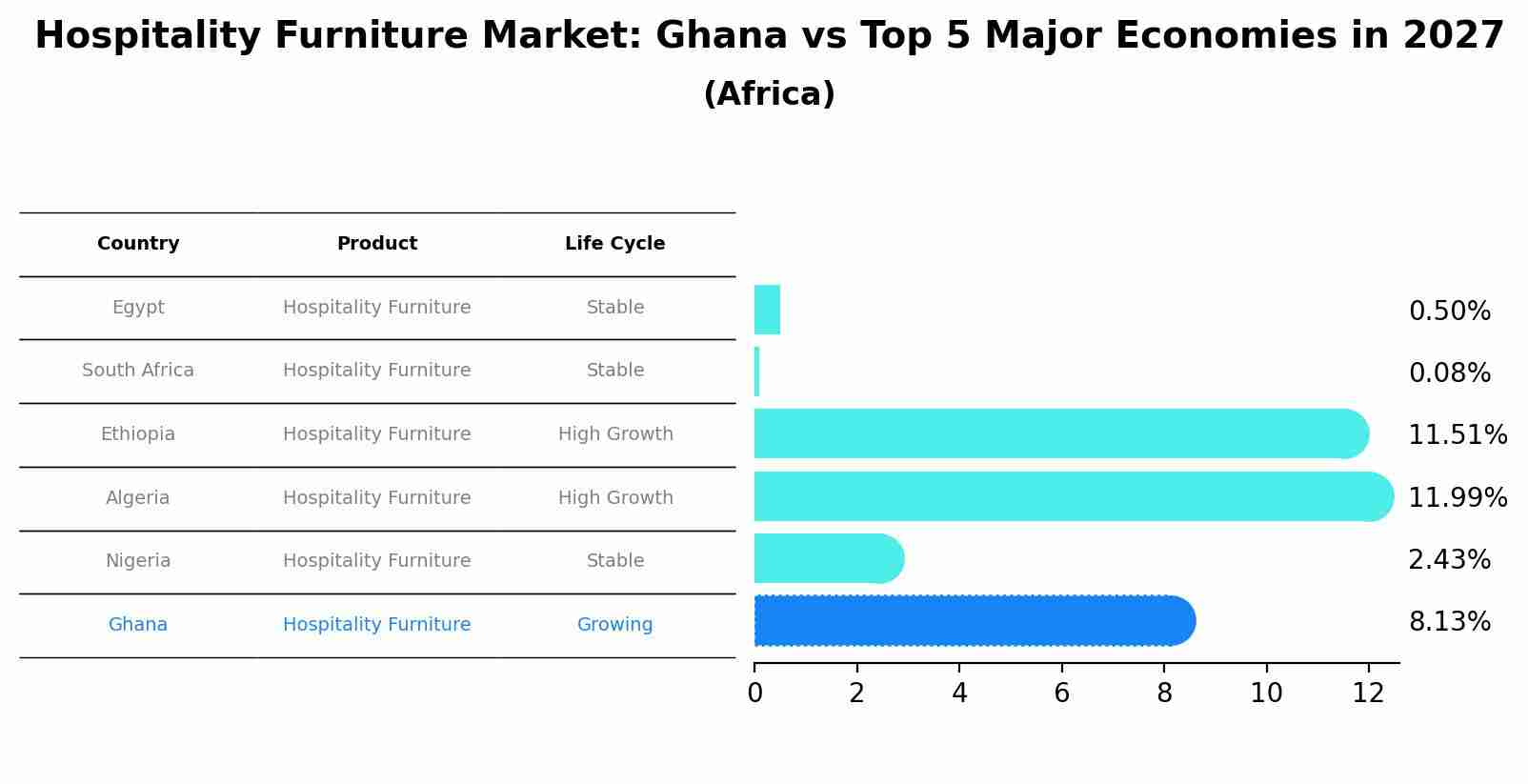Ghana Hospitality Furniture Market (2025-2031) Outlook | Value, Companies, Forecast, Share, Trends, Size, Revenue, Industry, Growth, Analysis
| Product Code: ETC371936 | Publication Date: Aug 2022 | Updated Date: Jul 2025 | Product Type: Market Research Report | |
| Publisher: 6Wresearch | Author: Bhawna Singh | No. of Pages: 75 | No. of Figures: 35 | No. of Tables: 20 |
Ghana Hospitality Furniture Market Size Growth Rate
The Ghana Hospitality Furniture Market is projected to witness mixed growth rate patterns during 2025 to 2029. Commencing at 7.87% in 2025, growth builds up to 12.71% by 2029.

Hospitality Furniture Market: Ghana vs Top 5 Major Economies in 2027 (Africa)
The Hospitality Furniture market in Ghana is projected to grow at a growing growth rate of 8.13% by 2027, within the Africa region led by Egypt, along with other countries like South Africa, Ethiopia, Algeria and Nigeria, collectively shaping a dynamic and evolving market environment driven by innovation and increasing adoption of emerging technologies.

Ghana Hospitality Furniture Market Synopsis
The Ghana Hospitality Furniture Market is witnessing steady growth driven by an expanding tourism industry and increasing investments in the hospitality sector. The market offers a diverse range of furniture products including hotel room furniture, lobby furniture, restaurant furniture, and outdoor furniture to cater to the needs of hotels, resorts, restaurants, and other hospitality establishments. Key trends in the market include a growing preference for stylish, durable, and eco-friendly furniture solutions. Local manufacturers and international brands are competing in the market, offering a mix of traditional and contemporary designs to meet the evolving requirements of hospitality businesses in Ghana. Factors such as rising disposable incomes, urbanization, and changing consumer preferences are expected to further drive the demand for hospitality furniture in Ghana in the coming years.
Ghana Hospitality Furniture Market Trends
The Ghana Hospitality Furniture Market is experiencing a shift towards more sustainable and locally sourced materials, reflecting a growing awareness of environmental impact among consumers. There is also a rising demand for unique and customized furniture pieces that provide a sense of authenticity and cultural relevance to hotel and restaurant spaces. Additionally, there is a trend towards incorporating technology into furniture design, such as wireless charging capabilities and integrated smart features, to enhance the overall guest experience. Collaboration with local artisans and designers is becoming more prevalent, leading to a fusion of traditional craftsmanship with modern aesthetics in hospitality furniture offerings. Overall, the market is evolving towards more eco-friendly, personalized, and technologically advanced furniture solutions to meet the changing preferences of both businesses and consumers in Ghana`s hospitality sector.
Ghana Hospitality Furniture Market Challenges
In the Ghana Hospitality Furniture Market, some challenges include limited access to quality raw materials and skilled labor, leading to higher production costs and limited customization options for furniture designs. Additionally, inconsistent supply chains and infrastructure issues can result in delays and increased lead times for furniture delivery. The market also faces competition from imported furniture brands, which may offer lower prices due to economies of scale. Furthermore, fluctuations in currency exchange rates and economic uncertainties can impact consumer spending patterns and overall market demand. To succeed in this market, companies need to focus on improving operational efficiency, investing in quality control measures, and developing unique value propositions to differentiate their offerings from competitors.
Ghana Hospitality Furniture Market Investment Opportunities
The Ghana Hospitality Furniture Market presents promising investment opportunities due to the country`s growing tourism industry and increasing demand for high-quality furniture in hotels, restaurants, and other hospitality establishments. Investors can capitalize on this trend by offering a range of furniture products tailored to the needs of the hospitality sector, such as durable and stylish pieces that provide comfort and enhance guest experiences. Additionally, there is a rising focus on eco-friendly and sustainable furniture options, presenting a niche market for investors to explore. Partnering with local manufacturers or suppliers can also provide cost advantages and ensure a competitive edge in the market. Overall, investing in the Ghana Hospitality Furniture Market offers the potential for long-term growth and profitability as the industry continues to expand.
Jordan Agar Market Government Policies
Government policies related to the Ghana Hospitality Furniture Market focus on promoting local production, supporting small and medium-sized enterprises (SMEs), and encouraging sustainable practices. The government has implemented initiatives such as tax breaks and incentives for local furniture manufacturers to boost domestic production and reduce reliance on imports. Additionally, there are regulations in place to ensure that furniture used in the hospitality industry meets quality and safety standards. The government also emphasizes the importance of environmentally friendly practices in the industry, encouraging the use of sustainable materials and production processes. Overall, these policies aim to stimulate growth in the hospitality furniture sector, create job opportunities, and contribute to the development of a sustainable and competitive industry in Ghana.
Ghana Hospitality Furniture Market Future Outlook
The future outlook for the Ghana Hospitality Furniture Market appears promising, driven by the country`s growing tourism industry and increasing investments in the hospitality sector. With the government`s focus on promoting tourism and improving infrastructure, there is a rising demand for high-quality, stylish furniture in hotels, restaurants, and other hospitality establishments. Additionally, the trend towards eco-friendly and sustainable furniture options is likely to influence purchasing decisions in the market. International collaborations and partnerships with global furniture manufacturers are expected to bring innovative designs and technology to the Ghanaian market, further boosting growth. Overall, the Ghana Hospitality Furniture Market is anticipated to witness steady expansion in the coming years, presenting opportunities for both local and international furniture suppliers to cater to the evolving needs of the sector.
Key Highlights of the Report:
- Ghana Hospitality Furniture Market Outlook
- Market Size of Ghana Hospitality Furniture Market, 2024
- Forecast of Ghana Hospitality Furniture Market, 2031
- Historical Data and Forecast of Ghana Hospitality Furniture Revenues & Volume for the Period 2021 - 2031
- Ghana Hospitality Furniture Market Trend Evolution
- Ghana Hospitality Furniture Market Drivers and Challenges
- Ghana Hospitality Furniture Price Trends
- Ghana Hospitality Furniture Porter's Five Forces
- Ghana Hospitality Furniture Industry Life Cycle
- Historical Data and Forecast of Ghana Hospitality Furniture Market Revenues & Volume By Type for the Period 2021 - 2031
- Historical Data and Forecast of Ghana Hospitality Furniture Market Revenues & Volume By Wooden Furniture for the Period 2021 - 2031
- Historical Data and Forecast of Ghana Hospitality Furniture Market Revenues & Volume By Leather & Fabric Furniture for the Period 2021 - 2031
- Historical Data and Forecast of Ghana Hospitality Furniture Market Revenues & Volume By Metal Furniture for the Period 2021 - 2031
- Historical Data and Forecast of Ghana Hospitality Furniture Market Revenues & Volume By Others for the Period 2021 - 2031
- Historical Data and Forecast of Ghana Hospitality Furniture Market Revenues & Volume By Applications for the Period 2021 - 2031
- Historical Data and Forecast of Ghana Hospitality Furniture Market Revenues & Volume By Economy Hotel for the Period 2021 - 2031
- Historical Data and Forecast of Ghana Hospitality Furniture Market Revenues & Volume By Extended-stay Hotel for the Period 2021 - 2031
- Historical Data and Forecast of Ghana Hospitality Furniture Market Revenues & Volume By Full-service Hotel for the Period 2021 - 2031
- Historical Data and Forecast of Ghana Hospitality Furniture Market Revenues & Volume By Luxury Hotel for the Period 2021 - 2031
- Historical Data and Forecast of Ghana Hospitality Furniture Market Revenues & Volume By Others for the Period 2021 - 2031
- Historical Data and Forecast of Ghana Hospitality Furniture Market Revenues & Volume By Industry Vertical for the Period 2021 - 2031
- Historical Data and Forecast of Ghana Hospitality Furniture Market Revenues & Volume By Hotels & Restaurants for the Period 2021 - 2031
- Historical Data and Forecast of Ghana Hospitality Furniture Market Revenues & Volume By Public Places for the Period 2021 - 2031
- Historical Data and Forecast of Ghana Hospitality Furniture Market Revenues & Volume By Corporate Offices for the Period 2021 - 2031
- Historical Data and Forecast of Ghana Hospitality Furniture Market Revenues & Volume By Others for the Period 2021 - 2031
- Ghana Hospitality Furniture Import Export Trade Statistics
- Market Opportunity Assessment By Type
- Market Opportunity Assessment By Applications
- Market Opportunity Assessment By Industry Vertical
- Ghana Hospitality Furniture Top Companies Market Share
- Ghana Hospitality Furniture Competitive Benchmarking By Technical and Operational Parameters
- Ghana Hospitality Furniture Company Profiles
- Ghana Hospitality Furniture Key Strategic Recommendations
Frequently Asked Questions About the Market Study (FAQs):
- Single User License$ 1,995
- Department License$ 2,400
- Site License$ 3,120
- Global License$ 3,795
Search
Thought Leadership and Analyst Meet
Our Clients
Related Reports
- Afghanistan Apparel Market (2026-2032) | Growth, Outlook, Industry, Segmentation, Forecast, Size, Companies, Trends, Value, Share, Analysis & Revenue
- Canada Oil and Gas Market (2026-2032) | Share, Segmentation, Value, Industry, Trends, Forecast, Analysis, Size & Revenue, Growth, Competitive Landscape, Outlook, Companies
- Germany Breakfast Food Market (2026-2032) | Industry, Share, Growth, Size, Companies, Value, Analysis, Revenue, Trends, Forecast & Outlook
- Australia Briquette Market (2025-2031) | Growth, Size, Revenue, Forecast, Analysis, Trends, Value, Share, Industry & Companies
- Vietnam System Integrator Market (2025-2031) | Size, Companies, Analysis, Industry, Value, Forecast, Growth, Trends, Revenue & Share
- ASEAN and Thailand Brain Health Supplements Market (2025-2031) | Strategy, Consumer Insights, Analysis, Investment Trends, Opportunities, Growth, Size, Share, Industry, Revenue, Segments, Value, Segmentation, Supply, Forecast, Restraints, Outlook, Competition, Drivers, Trends, Demand, Pricing Analysis, Competitive, Strategic Insights, Companies, Challenges
- ASEAN Bearings Market (2025-2031) | Strategy, Consumer Insights, Analysis, Investment Trends, Opportunities, Growth, Size, Share, Industry, Revenue, Segments, Value, Segmentation, Supply, Forecast, Restraints, Outlook, Competition, Drivers, Trends, Demand, Pricing Analysis, Competitive, Strategic Insights, Companies, Challenges
- Europe Flooring Market (2025-2031) | Outlook, Share, Industry, Trends, Forecast, Companies, Revenue, Size, Analysis, Growth & Value
- Saudi Arabia Manlift Market (2025-2031) | Outlook, Size, Growth, Trends, Companies, Industry, Revenue, Value, Share, Forecast & Analysis
- Uganda Excavator, Crane, and Wheel Loaders Market (2025-2031) | Strategy, Consumer Insights, Analysis, Investment Trends, Opportunities, Growth, Size, Share, Industry, Revenue, Segments, Value, Segmentation, Supply, Forecast, Restraints, Outlook, Competition, Drivers, Trends, Demand, Pricing Analysis, Competitive, Strategic Insights, Companies, Challenges
Industry Events and Analyst Meet
Whitepaper
- Middle East & Africa Commercial Security Market Click here to view more.
- Middle East & Africa Fire Safety Systems & Equipment Market Click here to view more.
- GCC Drone Market Click here to view more.
- Middle East Lighting Fixture Market Click here to view more.
- GCC Physical & Perimeter Security Market Click here to view more.
6WResearch In News
- Doha a strategic location for EV manufacturing hub: IPA Qatar
- Demand for luxury TVs surging in the GCC, says Samsung
- Empowering Growth: The Thriving Journey of Bangladesh’s Cable Industry
- Demand for luxury TVs surging in the GCC, says Samsung
- Video call with a traditional healer? Once unthinkable, it’s now common in South Africa
- Intelligent Buildings To Smooth GCC’s Path To Net Zero


















